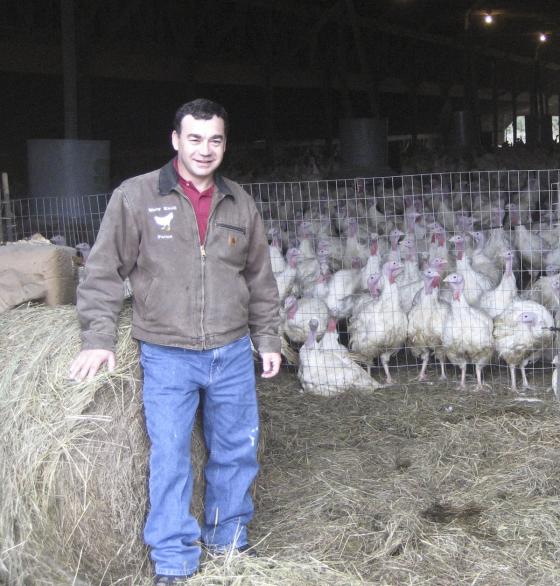Posted March 17, 2022 at 10:36am by Anonymous (not verified)
Misty Knoll Farms

Yes, there is a knoll—and it’s misty.
At least it was on the day this past October when I visited Misty Knoll Farms, Vermont’s largest chicken producer. Standing on the small rise at the eastern edge of the farm in New Haven, facing a swath of Addison County dairy land below and the spine of the Green Mountains beyond, I spotted a light fog in the valley that looked misty enough.
“There are wealthier farmers who have more than one knoll, but we have only one,” quipped my tour guide.
He was Rob Litch, farmer and part owner of Misty Knoll, and I was to become familiar with his droll sense of humor during my visit. But although there’s only one knoll on the farm, Litch and his business partner (and uncle), John Palmer, can boast of having something far more valuable, something the majority of American poultry farmers do not have: total control over how their birds are raised, processed, and marketed.
At their 412-acre farm, located on the sites of two former dairy operations, there are barns that house tens of thousands of chickens and turkeys—Rob and John decide exactly what those birds are fed and how they’re housed. There’s an on-site slaughter facility staffed by a USDA inspector and a series of rooms where 18 employees (a mix of local residents and Jamaicans with H2A guest worker permits) transform whole birds into parts—Rob and John oversee these parts of the operation, too. They also decide how much to charge for their poultry and where to sell it.
Contrast this with most poultry farmers in America, who must follow the dictates of the large agribusinesses they work with—Tyson, Perdue, Pilgrim’s Pride. These corporations often own the birds even as the farmers raise them and take on the debt of building the infrastructure to house them. The birds must be grown to the corporation’s specifications; they are then trucked miles away to slaughter facilities the farmer never sees.
Misty Knoll is far and away Vermont’s largest producer of chickens: 225,000 are raised there annually.
*Excerpted from Carrie Abels, “Counting Their Chickens,” Vermont’s Local Banquet, Winter 2011.
